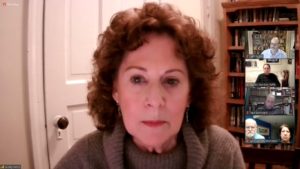
For the country’s Jewish community, Ukraine — the site of World War II’s infamous Babyn Yar massacre — has become a more tolerant place than it was even a few years ago.
That was one of the topics discussed during a virtual briefing, organized on March 3 by Bet Chaverim Congregation, which addressed the status of the country’s Jewish population in light of the Russian invasion. The event featured Lesley L. Weiss, the deputy director of the National Coalition Supporting Eurasian Jewry.
The size of Ukraine’s Jewish community varies widely, from 43,000 to 400,000, depending on the source. Weiss said the country’s Jewish population is approximately 200,000.
While the community is primarily concentrated in the larger cities like Kyiv, Odessa and Kharkiv, Weiss emphasized that there are Jews living across Ukraine, often in small villages or towns.
“Since the independence of Ukraine, we’ve seen an amazing revival of Jewish life, which is so tragic now,” Weiss said. “Throughout the country, we see synagogues, day schools, community centers, Hillels, kosher restaurants, more than we have in Washington, D.C., and every other kind of Jewish services available. So all that now is, of course, at great risk, and lives are at risk.”
At the time of the discussion, some 2,000 citizens had been killed according to reports, Weiss said. While she could not say how many of the dead included Jews, she noted that much of the fighting had taken place in the larger cities with significant Jewish populations.
Weiss also addressed one of Vladimir Putin’s justifications for pursuing this war, namely that Ukraine currently has a fascist, neo-Nazi and antisemetic government — a claim, she said, that the Russians have been using for years and which has zero basis in fact.
“I know there are some people, because of the history, very troubling history, of Ukraine in the Holocaust, that are quick to just write them off as a bunch of antisemites,” Weiss said, noting that she herself has Holocaust survivors in her own family.
“But as you know, Ukraine is led by a Jewish president,” Weiss continued. “The defense minister is Jewish, as is the president’s chief of staff. Many members of the cabinet are Jewish. The mayor of Kyiv, Vladimir Klitschko … tells us about his Jewish grandmother every time we see him.”
Additionally, in the previous three months, Ukraine’s parliament had passed two major pieces of legislation on fighting antisemitism, Weiss added, something her organization had been pressing Ukraine to do for years. She also noted that Ukraine and the United States had signed a memorandum of understanding containing language combating antisemitism. Finally, she added that in a recent Pew Charitable poll on negative perceptions of Jews, Ukraine was recorded as having one of the lowest such levels in Europe.
Ukraine is not perfect though, Weiss said. There are still honorings of groups and individuals who took part in killing Jews both before and during the Holocaust. However, she emphasized that progress has been made in this realm. She was personally present in October of 2021 for the 80th commemoration of the Babyn Yar massacre, along with the presidents of Ukraine, Israel and Germany.
“Since the Revolution of Dignity, which was in 2014, we’ve heard from many Ukrainian Jews that, for the first time, they are accepted as Ukrainian and not Ukrainian Jews,” Weiss said. “They don’t have that sense of hyphenated identity.”
Among the conversations that Weiss has been having with those still in Kyiv, the most “heartbreaking” are the ones with those seeking refuge in their basements, she said.
“Those are where I feel the most anguish, because what can I do for them?” Weiss said. “They’re in their basement, they go up during the day to get some food, and then at night they’re at home. But you know, Russians are closing in on Kyiv very quickly.
“They want us to get the message out that they need help,” Weiss said. “Of course they want weapons, and they want humanitarian assistance. Some of them just want to hear that we care, that someone is listening to them vent and that there’s someone out there in the United States that cares about them.”






